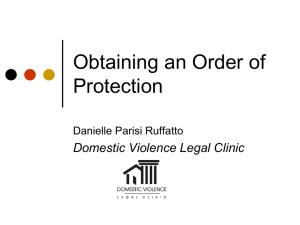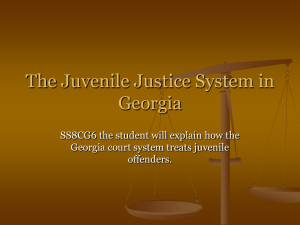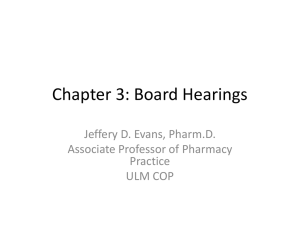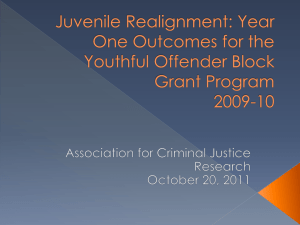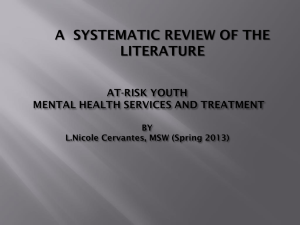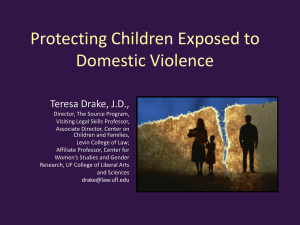SHYNERRA GRANT LAW Juvenile Protection Orders
advertisement
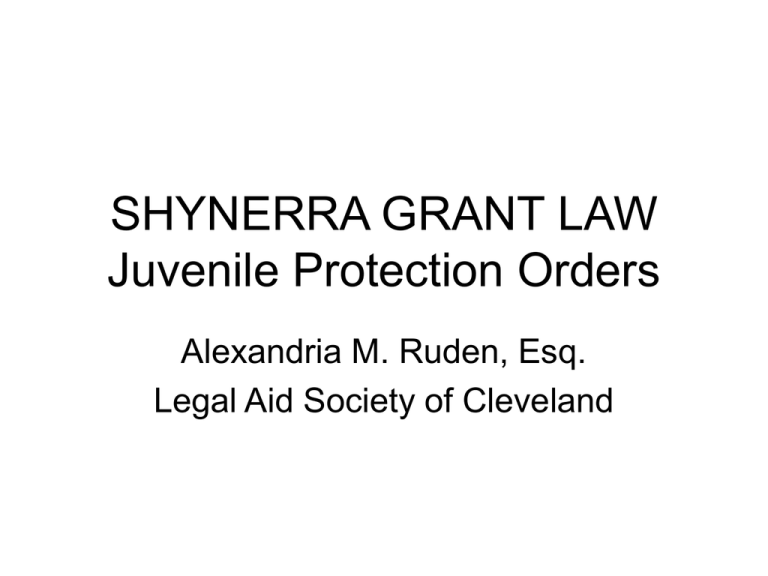
SHYNERRA GRANT LAW Juvenile Protection Orders Alexandria M. Ruden, Esq. Legal Aid Society of Cleveland AGENDA • • • • • Historical Context of Law Relevant provisions in Am. Sub. HB 10 Protection Order Forms Relevant Queries Q & A’s IMPORTANT DEFINITIONS • PETITIONER-a person who files a petition or on whose behalf a petition is filed. • RESPONDENT-a person under the age of 18 years. WHAT IS AM. SUB. HB 10? What is it? • The new law creates a civil procedure for the issuance of juvenile civil protection orders for certain behaviors committed by juveniles. What it isn’t? The new law is not a criminal proceeding against juveniles for committing certain offenses of violence. QUERY • How does the new law differ from the existing civil protection order laws? – The respondent is under 18 years of age. – The juvenile court exercises exclusive jurisdiction with respect to any proceeding brought under RC 3133.31 or RC 2151.34. – The juvenile court retains all dispositionary powers consistent with the existing rules of juvenile procedure and may also exercise its discretion to adjudicate proceedings as provided in RC 3113.31 and RC 2151.34. WHAT DOES IT DO? What it does? • The new law authorizes juvenile courts to issue and enforce a civil protection order (JCPO) against a minor (under 18), regardless of the familial relationship between the parties. How is this done? The law amends the domestic violence section of RC 3113.31 and creates a new section in the Juvenile Code, to wit: RC 2151.34. RELEVANT SECTIONS OF THE REVISED CODE • RC 2151.23(A)(16)-authorizes juvenile courts to issue civil protection orders against juveniles under 18 years (respondents) and enforce civil protection orders against a juvenile until a date certain but not later than the date the child attains 19 years of age. • RC 2151.34-creates a new procedure for issuing and enforcing a civil protection order or consent agreement. • RC 2151.358-amends the expungement statute to address sealing of civil protection orders. ADDITIONAL RELEVANT SECTIONS OF THE ORC • RC 2903.214-amends the civil stalking protection order statute to reflect that it applies to respondents OVER the age of 18 years. • RC 3113.31(A)(2)-amends the domestic violence civil protection order statute to state that the court with subject matter jurisdiction to issue civil protection orders against juveniles under 18 years is the juvenile division of the common pleas court of the county in which the person to be protected resides. WHO CAN FILE FOR A CIVIL PROTECTION ORDER (JCPO) • A petitioner is one of the following– Any person on behalf of that person – Any parent or adult family or household member on behalf of any other family member – Any person who is determined by the court in its discretion as an appropriate person to seek relief under this section on behalf of any child [RC 2151.34(C)(1).] • Query: Who has standing to file? Who is an inappropriate person? QUERY • Can a juvenile file a petition? Yes. – No relationship is required between the petitioner and respondent – Age of petitioner is irrelevant – The person filing the petition can be an adult or another juvenile (even if filing on his/her own behalf) THE CONTENTS OF THE PETITION • The petition should be filed on the forms promulgated by the Supreme Court of Ohio. • Petition shall contain an allegation that respondent engages in behavior that violates certain Revised Code sections. [RC 2151.34(C)(2).] • Petition must include a description of the nature and extent of the violation. Note: JCPO can be requested based on certain allegations even if juvenile is NOT charged with delinquency. • A petition may request electronic monitoring of the juvenile. • Petition must request some type of relief. RC 2151.34-Offenses • Offenses [RC 2151.34(C)(2)(a).] – – – – – – – – – Felonious assault Aggravated assault Assault Aggravated menacing Menacing Menacing by stalking any sexually oriented offense under RC 2950.01 Aggravated trespass Domestic violence under RC 3113.31(A)(1) if the relationship between the petitioner and respondent is a family/household member relationship OTHER IMPORTANT FACTS • There is no right to counsel. The appointment of counsel to a respondent is within discretion of the court. [RC 2151.34(O).] • Note: but see Leone v. Owen, 2010-Ohio1888 (6th Dist. Erie County 2010) – Consider appointing a Guardian ad Litem for the petitioner or respondent if a conflict arises with either parties’ parents. NOTICE • The juvenile court has discretion to decide whether to give NOTICE that a petition has been FILED to: – A parent of the child (if the petition is filed by the child or a non-parent). – Any other person deemed to be an appropriate person to receive notice of the filing of the petition. [RC 2151.34(C)(3).] – Note: This is not the same as notice of the hearing. QUERY • What about providing NOTICE to a prosecutor or children’s services agency? • Who are other “appropriate persons” for either NOTICE or filing of the petition? EX PARTE HEARING • If an ex parte JCPO is requested by petitioner, the court must conduct a hearing as soon as possible after the petition is filed, but not later than the next day after the court is in session after the petition is filed. [RC 2151.34(D)(1).] • If requested, the court must find good cause that the order is necessary for the safety and protection of the petitioner. • Immediate and present danger constitutes good cause and includes: – Situations in which respondent has threatened the petitioner with bodily harm – Situations in which respondent has been convicted of or plead guilty or been adjudicated a delinquent child for committing any one of the offenses alleged in the petition. EX PARTE HEARING • Standard of proof for the issuance of ex parte JCPO-appears to be probable cause. Note: based on case law derived from domestic violence and stalking civil cases. • The Court may issue temporary orders upon a showing of good cause, including an ORDER FOR BOND. [RC 2151.34(D)(1).] – Query: What is the reason for bond? Who is responsible for posting the bond? Juvenile? The parent? the other appropriate person? EX PARTE HEARING • If the ex parte JCPO is granted, there must be a full hearing within 10 COURT days. [RC 2151.34(D)(2)(a).] • The respondent AND his/her parents, guardian or legal custodian are notified of the full hearing. FULL HEARING • Full hearing held on the date scheduled unless court grants a continuance, which can be granted to a reasonable time as determined by the court and for the following: – Lack of service on respondent – Parties agree to continuance – Continuance is needed to allow a party to obtain counsel – Other good cause [RC 2151.34(D)(2)(a).] FULL HEARING • An ex parte JCPO granted by the court does not expire because the court grants a continuance for any of the above mentioned reasons. • Standard of proof-preponderance of the evidence. Felton v. Felton, 1997-Ohio-302. • What happens to the petition if the court does not grant an ex parte JCPO? What happens if a petitioner does not file for an ex parte JCPO? – There must still be a full hearing and the court can proceed as in a normal civil action. – The court shall schedule a full hearing and proceed as in a normal civil action. PROCEDURAL ISSUES • AS TO FORM – Detailed affidavit as to time and place – Consider adding all acts in affidavitrespondent may decide to argue his due process rights were violated if victim testifies to something not alleged in petition. – If unsure of date, state “on or about” (defense attorneys are quick to turn a wrong sure date into an alibi) PROCEDURAL ISSUES • Use detailed affidavit to demonstrate a pattern of conduct and abuse if needed • Statutes states that the nature and extent of violation/violence must be described– To show the history of abuse – To put respondent on notice as to allegations – Providing notice enhances his ability to defend against allegations but limits discovery EX PARTE HEARING ISSUES • Always verify parties’ relationship • Introduce evidence of history of abuse, especially when the violation involves a threat • If ex parte not granted, make sure a full hearing is scheduled DISCOVERY CONCERNS • Decide whether the rules of civil procedure apply so as to permit discovery – Delay tactic – Intimidation – Discovery for pending delinquency case – Fishing expedition for documentary evidence – Since short turn around time to full hearing, may not be in interest of court DISCOVERY CONCERNS • A prohibition against discovery does not unfairly prejudice respondent • A prohibition against discovery does not hinder respondent’s ability to prepare and present a defense • A prohibition against discovery does not violate respondent’s due process rights • Ohio statute already demands more than general allegations of conduct FULL HEARING CONCERNS • What does it mean to hold a full hearing? • What are 10 court days? • Does the full hearing have to be concluded on the same day? • Does a full hearing have to be heard on the same day it is scheduled? • Can a respondent file a responsive pleading? FULL HEARING CONCERNS • What if petitioner fails to appear at the full hearing? • Can a petitioner continue the full hearing more than once for a failure of service? • How will a respondent be served with the petition and the order and notice of the full hearing date? • Must evidence be presented at the full hearing OTHER PROCEDURAL ISSUES • Can the court require the parties to take lie detector tests? • Can the petitioner request that the JCPO be dismissed? • What is the procedure for serving JCPOs issued after the full hearing? What is adequate proof of service? • Who are protected parties? TERMS OF THE JCPO • After the full hearing, the Court may issue any protection order (with or without bond) that contains terms designed to ensure the safety and protection of the person to be protected. [RC 2151.34(E)(1)(a).] – No contact provisions – Removal from the home – Weapons, school, residence, employment prohibitions OTHER TERMS • ELECTRONIC MONITORING-if properly requested in the petition or by the court, on its own at the hearing, MAY order electronic monitoring of a respondent if there is clear and convincing evidence that: – The petitioner reasonably believed that the respondent’s conduct at any time preceding the filing of the petition endangered the health, welfare or safety of the protected person; and – The respondent presents a continuing danger to the protected person [RC 2151.34(E)(1)(b).] OTHER TERMS • ELECTRONIC MONITORING-if ordered by the court, the court must: – Direct the sheriff or other appropriate law enforcement agency to install the devise and monitor the respondent; – Require the respondent to pay for the monitor; – If indigent, monitor is paid from state Crime Victim Reparation Fund. Note: until the annual payment from fund exceeds $300,000 at which time the court can no longer order. OTHER TERMS • Duration of JCPO-valid until a date certain, but not later than the date on which the respondent attains 19 years. • JCPO may be renewed in the same manner as the original order was issued. • JCPO does not affect title to real property. • JCPO cannot be waived or nullified by invitation or consent of the protected person. OTHER TERMS • Court has discretion to determine that a respondent alleged to have violated the order should not be found in contempt or prosecuted under RC 2919.27 for violating the order if the violation was based on the invitation or consent of the person to be protected. • Note: petitioner’s invitation or consent to the respondent’s violation is an affirmative defense to the violation. RECIPROCAL JCPO • The Court cannot order or restrain a petitioner unless a cross petition is filed and a hearing is held: – Respondent must file a separate petition and fulfill the same statutory requirements as the petitioner. – Notice of this petition must be served on the petitioner at least 48 hours before the hearing, unless waived by petitioner. – After a full hearing where both parties present evidence, the court may grant respondent a JCPO. Note: This is the only way parties may have mutual protection orders. Caveat: If original petitioner requested an ex parte JCPO, do not delay any hearing on that request in order to consolidate a hearing on respondent's request for JCPO QUERY ON RECIPROCAL JCPOs • Petitioner files for a JCPO against a juvenile who is 17 years of age. • Respondent wants to file a petition against the original petitioner. Original petitioner is 19 years old. • Can both petitions be filed in Juvenile Court? • Must respondent’s petition be filed in Common Pleas-General Division? ISSUANCE OF THE ORDER Court shall direct that a copy of either an ex parte or full hearing JCPO be delivered, on the same day the order is entered, to: – Respondent. – Law enforcement agencies having jurisdiction to enforce the order. – The parent, guardian or legal custodian of the respondent. Query: What does “direct” mean? What does “delivered” mean? Does this mean “personal service”? Are other kinds of service of process permissible? Is personal service necessary for a CPO issued after the full hearing? How is petitioner provided with NOTICE? OTHER ASPECTS OF RC 2151.34 • Rules of civil procedure apply to juvenile civil protection order proceedings • The JCPO shall contain a provision that all records of the proceeding shall be sealed by the court on the date the respondent attains 19 years unless the petitioner submits evidence to the court that the respondent has failed to comply with all of the terms of the JCPO. • No fees or costs shall be assessed to either petitioner or respondent for filing, issuing, registering or serving the juvenile. OTHER ASPECTS OF RC 2151.34 • An order issued after a full hearing that grants or refuses to grant a JCPO is a final appealable order. • The remedies are in addition to and not in lieu of other civil or criminal remedies available under RC 2151 or 2152. • Petitioner may have access to a victim advocate for all proceedings [RC 2151.34(L).] REGISTRATION OF A CPO • Requires law enforcement agencies to maintain a protection order index. • Full faith and credit of foreign JCPOs. • A petitioner can register a JCPO in another county in this state other than the county which issued the order or can register an order issued by another state by: – Obtaining a certified copy of the order and presenting the order to the clerk of the municipal court clerk or county court clerk for endorsement. [RC 2151.34(M).] NOTICE • When a JCPO is issued, the court must provide the “parties” to the order with the following NOTICE orally or by form: – “As a result of this order, it may be unlawful for you to possess or purchase a firearm, including a rifle, pistol or revolver or ammunition pursuant to federal law under 18 USC 922(g)(8). If you have any questions whether this law makes it illegal for you to possess or purchase a firearm or ammunition, you should consult an attorney” – Applies only to respondent – Included in standard forms VIOLATION OF JCPO • If the juvenile violates the JCPO, he/she is subject to both prosecution as a delinquent under RC 2919.27 or contempt of court. • Punishment for contempt does not bar prosecution for violating the order under RC 2919.27, BUT credit must be given for the punishment imposed upon conviction or adjudication as a delinquent child. • A juvenile convicted or adjudicated as a delinquent child shall not be subsequently punished for contempt of court out of the same activity. VIOLATION OF JCPO • RC 2919.27 outlines criminal penalties for violating the civil protection order. • Juvenile court retains jurisdiction for adjudicating violations including while the respondent is 18 years old. [RC 2152.02(C)(7).] SEALING OF RECORDS • If the JCPO is not granted, all records of the proceeding are automatically sealed. • If the JCPO is granted, all records of proceeding are automatically sealed when respondent attains 19 (on birthday) if compliance with terms. • If non compliance of terms, Court or juvenile, on motion to seal records, may still seal records 2 years after the expiration of JCPO. • Notice and the opportunity to respond (within 30 days) must be given to the victim/victim’s attorney • • Hearing must be held within 30 days after receipt of response. Even without a response, court has discretion to hold a hearing. • If records are sealed, they may still be subject to inspection under certain circumstances set forth in RC 2151.358(D)(4). OTHER POINTS OF INTEREST • Filing a petition under RC 2151.34 does not relieve the statutory responsibility for reporting child abuse or neglect under RC 2151.421. RELIEF UNDER RC 3113.31 Domestic Violence Statute • In addition to the remedies provided in RC 2151.34, a petitioner may seek relief under RC 3113.31 against a respondent who engages in domestic violence against a family or household member. -spouses -former spouses -persons who have a child together and who don’t live together -parents, children and others related by blood or marriage -persons living as spouses -foster parents RC 3113.31 • Domestic violence is defined as: – Attempting to cause or recklessly causing bodily injury. – Placing another by threat of force in fear of imminent serious physical harm or committing a violation of menacing by stalking or aggravated trespass. – Committing an act that results in a child being abused as defined under RC 2151.031. – Committing a sexually oriented offense. RC 3113.31 • Only applies to family or household members so the new law may apply to parents against children or siblings or juveniles who have a child together. • Permits consent agreements. • Allows for modification and termination of JCPOs. • Maximum length of time is 5 years from date of issuance OR not later than juvenile’s 19th birthday. • No prescribed provision regarding court appointed counsel. • Applies to foster parents Note: Can foster children seek protection against their foster parents? RELEVANT QUERIES • What is the criteria for a court appointed attorney? • What is the process for a parent to file on behalf of a child? Next friend? What about another “appropriate” person? Does the Court conduct an “appropriateness” hearing? What happens to the filing when a person is determined not to be an “appropriate” person? • Can the court order electronic monitoring under RC 3113.31? • Can a JCPO be modified or terminated or consented to under RC 2151.34? RELEVANT QUERIES • Can a JCPO be filed when the respondent is already 18? • What is the court’s authority to enter other orders against a juvenile if the court denies the JCPO? • What is the process for removing the child from the home? • Is RC 2151.34 a criminal statute such that a criminal conviction/offense is necessary before the JCPO can be filed? RELEVANT QUERIES • What is the potential of excluding respondents from school in violation of RC 3313.66? • Can you apply the adult civil rules to juvenile procedure? • To what extent to schools have to accommodate JCPO provisions? • How are schools noticed about the existence of a JCPO? • What liability do schools incur for failing to enforce the terms of the JCPO? RELEVANT QUERIES • Is there an obligation to appoint counsel for a petitioner? • Can a JCPO issued under RC 2151.34 last longer than 5 years? • How can confidentiality of the proceedings be maintained? • Can DCFS file a JCPO against a juvenile in its care? • By stating that a parent can file on behalf of a child, does that make the testimony presented by the parent an exception to hearsay? OTHER RELEVANT QUERIES • Can the juvenile court renew a JCPO anytime before the juvenile’s 19th birthday? • Can the JCPO terminate before the juvenile’s 19th birthday? • What is the impact of a JCPO on ADA (Americans with Disability Act) in light of the broad definitions of what behaviors are proscribed? JCPO FORMS and SUP. R. 10.05 • 10.05-A How to Complete a Petition for a JCPO or a Juvenile Domestic Violence CPO • 10.05-D Petition for JCPO or Juvenile Domestic Violence CPO • 10.05-H Warning Page • 10-A Protection Order Notice to NCIC • 10-B How to Complete a Protection Order Notice to NCIC SUP. R. 10.05 & FORMS • 10.05-B Juvenile CPO Order Ex Parte • 10.05-C Juvenile CPO Order Full Hearing • 10.05-E Juvenile Domestic Violence CPO Ex Parte • 10.05-F Juvenile Domestic Violence CPO Full Hearing • 10.05-G Juvenile Consent Agreement and Domestic Violence CPO NCIC FORM ISSUES • • • • • • Concerns about listing protected parties Expiration of the order Brady disqualification issues Identifying characteristic Terminating and taking order out of NCIC New NCIC if terms are modified
